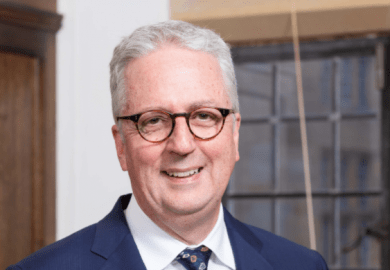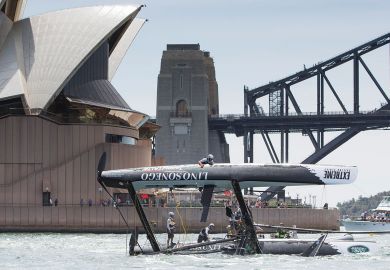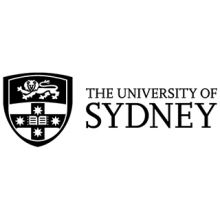Australian universities will get nowhere by “crying poor” to the federal government, even though it has drastically reduced its support for them over the decades, according to former political apparatchik, media boss and education bureaucrat Mark Scott.
Professor Scott said that when he was a student at the University of Sydney, which he now leads, 90 per cent of its funding came from Canberra. That share has since plummeted to just 30 per cent, he told the Times Higher Education Leadership and Management Summit.
Nevertheless, universities need to be “asking for less but listening more”, Professor Scott said. “You want to be engaging with the government by being in the solutions business, rather than [walking] the corridors of power with the begging bowl out, trying to make an argument that you are poor,” he said.
“There is no appetite for an Australian vice-chancellor to go to a minister for education and cry poor. If you do cry poor, you [will] find yourself in a queue of many, many people who will also be arguing that they have dramatic and specific needs that need immediate funding.”
Professor Scott said that the government was a “critical” stakeholder because, while it had assumed minority funder status, it still determined “100 per cent of the regulatory environment” in which universities operated.
“In my experience, ministers and governments are far more likely to engage with organisations who are in the solutions business,” he said. “Universities need to…try and provide deep and nuanced insights into the problems the government faces. Think about how you are uniquely positioned to broker the skills and understanding you have within to help provide solutions.”
While acknowledging universities’ “complex relationship” with the federal government, he said that it was not hard to find common ground during a pandemic. The ministers he had spoken to since taking office in July had been “overwhelmingly positive” about universities’ efforts to forge a “clear understanding” of Covid-19 and communicate about it in a “dispassionate” way.
He said that he had weathered a similarly “contentious” environment during his decade-long stint as managing director of Australia’s national broadcaster, the ABC. “The public broadcaster and governments often have a difficult relationship. Politicians may not have liked the organisation too much. But…if you were seen to be in a position to deliver a solution to the challenges the government faced, they would go and fund and engage with the organisation.”
Professor Scott said he was optimistic about the Australian sector’s future, despite the damage wrought by Covid – particularly to international education. But he said that universities needed to work harder to sell themselves by “mining the magic” of their “rock star” researchers.
“The thing that makes the public believe and engage in higher education is when they get excited about research, particularly technological breakthrough, and then they see the impact. Find the stories, find the audience, have a distribution strategy, and keep telling your story.
“There’s an old maxim in politics that says just when you’re sick of saying it, people are beginning to hear it for the first time.”
Register to continue
Why register?
- Registration is free and only takes a moment
- Once registered, you can read 3 articles a month
- Sign up for our newsletter
Subscribe
Or subscribe for unlimited access to:
- Unlimited access to news, views, insights & reviews
- Digital editions
- Digital access to THE’s university and college rankings analysis
Already registered or a current subscriber?











